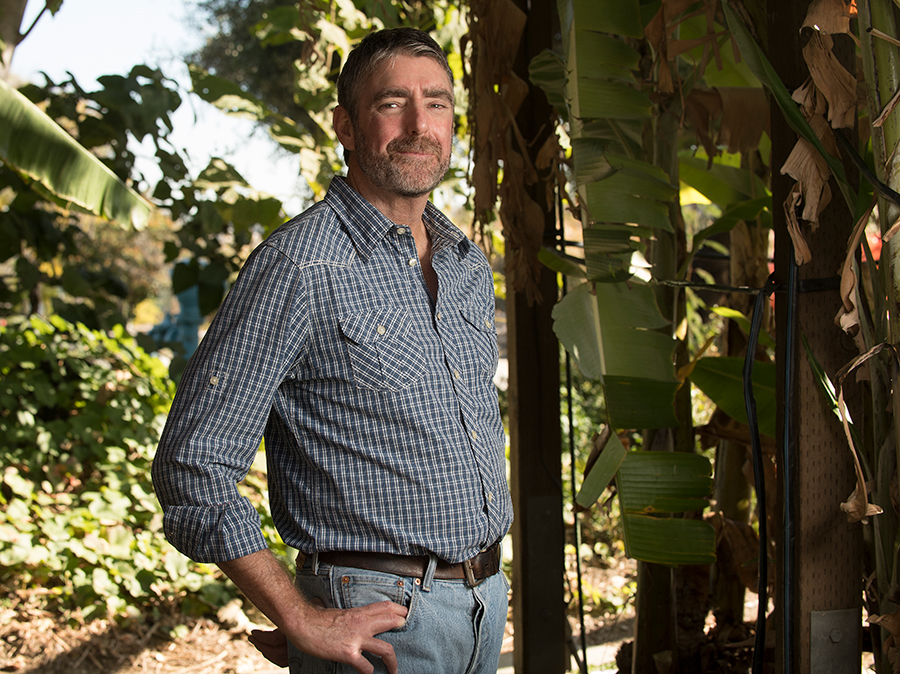Firescaping and Sustainable Land Management: Q&A with Douglas Kent
November 5, 2018

This year marks Douglas Kent’s (’06, master’s in regenerative studies; ’10, master’s in landscape architecture) decade milestone as a lecturer at the Lyle Center for Regenerative Studies. An activist and principal of Douglas Kent + Associates, Kent’s expertise is in ecological land management, firescaping and post-fire recovery. He's been quoted recently in recent news coverage of California's most unforgiving fire season yet: according to the California Department of Forestry and Fire Protection 7,983 fires burned more than 1.8 million acres between April 3 and Nov. 22.
Kent has written several books on his field specialty and has published more than 50 articles in major newspapers such as the Los Angeles Times and the Orange County Register, and magazines including the Marin Independent Journal. His book, Ecological Land Management, is used in two ENV courses: Current Applications in Regenerative Studies, a lecture/lab that explores the application of regenerative processes and technologies in community, energy, food, water, waste and biotic (relating to living things) systems; and Landscape Design and Natural Processes, where students delve into the application of ecosystematic principles – the integrated study of the ecology and evolution of natural ecosystems – to solve physical problems in landscape design.
- California Friendly (Muni, 2017): Arguably the most comprehensive book on maintaining California’s new century landscapes, thousands of copies have been distributed throughout Southern California. The book is not only free, but also not copyrighted, which means anyone can copy/paste the information and use it as their own. This project was funded by a first-ever collaboration between the Los Angeles Department of Water and Power, Metropolitan Water District and Southern California Gas Company.
- Ocean Friendly Gardens (Surfrider Foundation, 2009): Ocean-friendly gardens can be found along the Southland’s coast. Ocean Friendly is more than a book; it is a national education program that has been successful in coastal communities throughout the United States. This is how-to program enables landscapers, gardeners and homeowners to slow, stop and clean stormwater runoff.
- Firescaping (Wilderness Press, 2005): Kent’s best-selling book on landscaping for fire protection in California has taken him to communities throughout the state and attracted media throughout the Western United States at the time of its publication. It investigates landscape design, maintenance techniques, and post-fire recovery strategies in detail.
Kent recently gave the following interview about teaching and writing about sustainable landscape architecture.
In writing your books, did you always envision them for classroom use or as guidelines for practitioners in the public and private sectors?
This work has been designed for measureable and meaningful impacts. Its primary audience is the people actually doing the work and the organization and formatting had to be readily accessible; a lot of step-by-step processes, relevant callouts, and detailed indexes helped make the work digestible. All three books are now used in teaching environments throughout the state, although that was never their primary goal (but it is now!).
How has teaching land management and sustainable landscape architecture evolved for you during your time at the Lyle Center?
My gosh, I have learned a ton while teaching at Cal Poly Pomona. We attract incredibly inquisitive and intelligent students and staff and there’s little chance of getting away with poor information, inaccurate statements, or glib remarks—I love it. My writing and communication skills have been honed here. My last book, California Friendly (March 2017), took only a year to produce; yet it is already used as a teaching platform for conservation agencies and some UC Master Gardener programs (http://mg.ucanr.edu). That kind of production is a fantastic skill and it has been polished at Cal Poly Pomona.
How have our needs, societal attitudes and environmental stewardship priorities changed, based on your professional observations? What principles do you impart to your students?
California is getting greener by inches, and has been doing so for decades. We lead the nation in all types of environmental adaptation and modification performance strategies. But we have miles to go. We are still one of the most consumptive societies in the world. More than ever, and with more people than ever, California needs professionals that are skilled at the hard jobs—people that can reduce commute miles, create closed loop textiles or turn waste into a resource. Cal Poly Pomona’s how-to ethic and environmental training are essential for the state’s, if not planet’s, future.
Like John Lyle, Aldo Leopold and Henry David Thoreau, I would love to say that I inspired my students to question conventional wisdom and conventions. Whether building or environmental standards, cultural or structural practices, just because something was beneficial once does not mean it is always beneficial. Ecosystem thinking demands that we be dynamic. I would be most proud to say that we create dynamic thinking professionals.